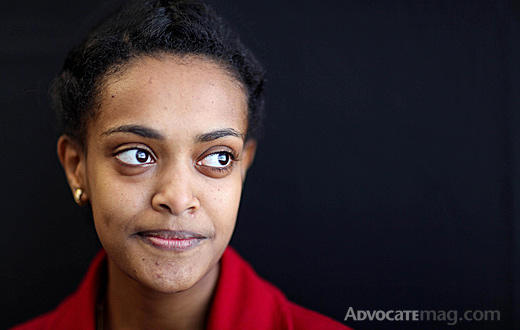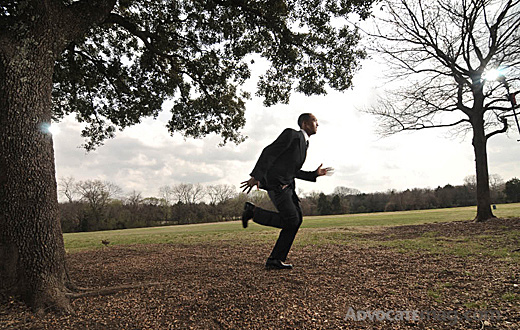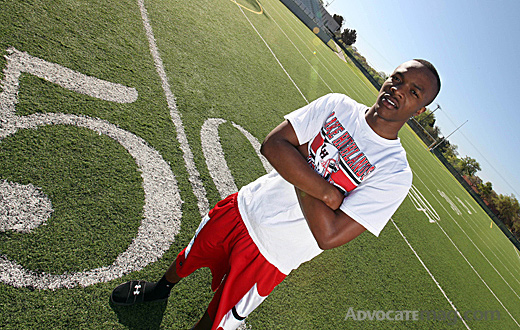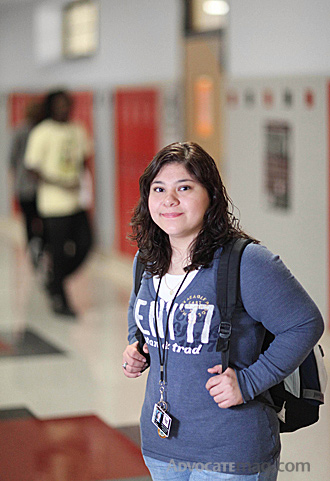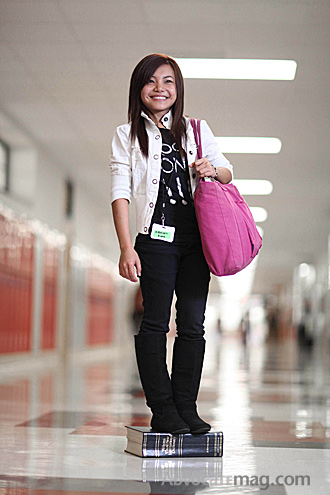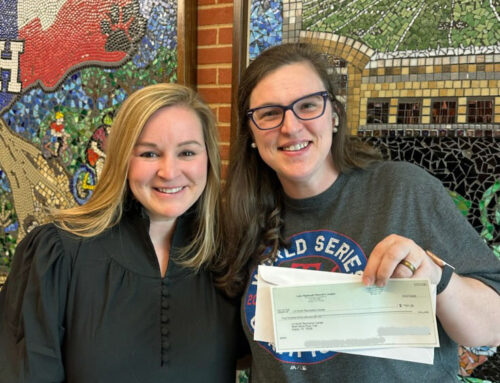High school graduation is a milestone. Some acquire their diploma easily. Others earn theirs against all odds. These graduating seniors didn’t let life’s blows keep them down. This month, they will cross the commencement stage knowing their tribulations made them stronger.
Danait Tesfaye has a gentle yet powerful presence.
[youtube]http://www.youtube.com/watch?v=Giv_caJGuSA[/youtube]Her body is small, and her features are delicate — except for her eyes, which are big, dark and knowing.
She speaks with perfect pronunciation and a confident pitch, and she listens to questions and explanations without a hint of fidgeting or jumpiness common in teenagers.
She seems shaken only when we talk about her father, a former Ethiopian politician who was imprisoned during the country’s civil war.
“I miss my dad,” she says, eyes shifting downward.
Through some long pauses and tears, she says that when her family lived in Ethiopia in the 1990s, a new government imprisoned her dad, Haile-Leul Eyakem, along with many other politicians, leaving her mom, Sisaynesh Beda, to raise Tesfaye and her brother, Abiy.
In 2006, the three moved to the U.S., leaving her father behind.
“At first, I was excited. We all knew about the American dream. We thought that’s how it would be here — a dream come true.”
Instead, her first couple years in Lake Highlands were a nightmare. She experienced culture shock, was hurting over the extended separation from her father, and was plagued by loneliness and fear in an unfamiliar environment.
“I was in eighth grade, and I knew no English. It was so hard. I would talk to my dad on the phone, and I cried so much every time.”
And life was different here, she says. Take snow, for example.
“The first time it snowed here, I was in shock. I knew about snow, but I had never seen it before.”
By the time she entered ninth grade, she says, her English had improved, but she still felt painfully shy. Other students made fun of her speech and, until she joined the AVID club, she was still insecure.
“AVID is where I started to gain confidence. I felt welcome and made friends. They praised my English and gave me confidence, and it continued to improve.”
The American school system is different from that in Ethiopia, and Tesfaye says it wasn’t until she joined AVID that she understood how it worked.
“The AVID teachers became like second parents to us. I wouldn’t be here if not for them,” she says.
AVID coordinator Corrie Myers recalls that shyness from the first year she met Tesfaye.
“She was very quiet, very hard-working. She would basically hide in the back of the room,” Myers says. “But there was always something about her. I have seen her blossom — now, I see her in the hall with groups of friends, and it makes me smile.”
As Tesfaye worked her way through LHHS, she became involved in math, science, pre-health and multicultural clubs — she is an officer of the Africa Club — and student council.
She will enter Texas Women’s University in the fall. She is a legal resident of the United States and is working toward citizenship status.
Today when Tesfaye sees other students struggling with issues she has faced, she tries to help them.
“I advise them to be strong and to not give up. You can’t go back,” she says. “I tell them not to be afraid to speak — if people laugh at you, laugh with them.”
Her family is anticipating her graduation.
“My mom is excited, but she doesn’t want me to go too far away.”
When her father learned she had been accepted to the university, he was impressed, she says. Her tears well up again.
“He just said, ‘wow’. He says he’s proud of me.”
Eyobe Tamene wears a grey suit slightly oversized for his rangy frame.
[youtube width=”520″ height=”320″]http://www.youtube.com/watch?v=DYFEUl_QBGo[/youtube]“I wanted to look nice for you guys,” he says, firmly shaking the Advocate photographer’s hand. “It’s my dad’s suit.”
Back when he was young and naïve — ninth grade — he wore sagging pants, he says.
“I regret the way I acted during ninth and some of 10th grades. I let my grades drop. When I started thinking about college, my attitude started to change, and I started dressing differently.”
Today, he’s the vice president of the Africa Club and Mu Alpha Theta and is president of the UIL Science Club. He has a 3.4 GPA (at the time of our March interview), and he’s a cross country and track star. He won the Lake Highlands Exchange Club’s Character Counts award. He’s on course to attend college at the University of North Texas, Oklahoma State or Baylor University, where he will study aerospace engineering. He has good friends, and he speaks English eloquently.
But the road to this place took some detours.
Until 2006, Tamene lived in Ethiopia with two siblings and his grandparents. His father, a member of the Ethiopian Army, was arrested and only narrowly escaped death. His father in 1998 was allowed to move to the U.S. after being offered a diversity immigrant visa, granted by the Department of State to people from countries with low rates of immigration to the U.S. Tamene eventually joined his father here. He never knew his mother, he says.
His early days at Forest Meadow Junior High were some of the worst of his life, he says.
“I hated school. I didn’t speak English at all. I was made fun of for the way I talked. I didn’t want to go to school. I just can’t describe how bad I felt,” he says.
When he moved to the Lake Highlands Freshman Center, he desperately wanted to fit in. He wanted to be a part of a team. So he joined the football team.
“That was a bad decision,” he says, laughing heartily and shaking his head. Football was physically tough and confusing for the thin ninth grader.
“I didn’t know the plays; I sat on the sideline all season,” he says. “It was miserable, so next I tried soccer.”
At the time, he says, he didn’t care about school. He just wanted some friends and to be involved in something.
“In 10th grade, the track coach asked me to start running. I hated running. On the first day, some of the girls even beat me,” he says, still smiling.
But he continued to improve. “Running changed me,” he says.
He still struggled in school.
“It was hard at home. There were five of us living in a two-bedroom apartment, and it was hard to study. I started to give up. I failed classes in 10th grade.”
But then AVID coordinator Corrie Myers noticed him. Even in a crowded reading class, Tamene stood out.
When the kids finished their work, most of them chit-chatted with one another — not Tamene.
“He sat next to a bookshelf crammed with random sundry titles, and when he finished working, he reached back and grabbed a book,” Myers says. “Sometimes he would come up and ask to borrow one, but he mostly sat quietly and read.”
Tamene says he might have just been waiting for someone to notice him.
“When I realized she thought I was smart, it felt good. I wanted to impress her,” he says. “I didn’t even know what an AP class was, but Ms. Myers said I had to enroll in them if I wanted to join AVID.”
He wasn’t sure he wanted to put in that sort of effort, but a fellow student, Kevin Nduke, who would become his best friend, convinced him to enroll in AP classes and AVID, saysing it would help Tamene get to college.
“I hadn’t even thought about college,” Tamene says, “but I did it. The first AP class, the teacher asked me a question, and I didn’t know the answer. I felt like the stupidest kid in the room, but Kevin convinced me to stick with it.”
Tamene’s father — who after being laid off took a job at 7-Eleven where he works long hours — encourages him too.
“In Ethiopia, my grandfather was a teacher. My dad regrets not going to school, and he encourages me to work hard so I can be successful.”
Today, on the Lake Highlands track team, Tamene is second only to Meron Fessahaie, a three-time District 9-5A gold medalist.
Fessahaie is his friend. But, he says, “my goal is to beat him.”
He hopes that someday he can motivate other kids the way his friend, Kevin, motivated him.
“I want to tell them not to screw up. I look back on ninth and 10th grade and wish I’d tried harder. But there’s no going back now.”
Constance Ibe has a contagious smile.
It lights up the room and warms everyone in it. But she tells us about a scared, beaten, angry and sad middle schooler who couldn’t make friends — that was her up until age 13, when her father finally left the family.
The oldest of five children, she says she received the brunt of the abuse. She was forced to quit all extra-curricular activities including sports, which she loved.
“I wanted to be something. I knew I had a lot going for me, but he told me I would wind up pregnant before I finished high school, or that I would be in jail.”
She set out to prove him wrong.
When she was in seventh grade, she says, her father legally relinquished his parental rights. She attended Liberty Junior High in RISD and began joining clubs, including Advancement Via Individual Determination, where she made friends. In eighth grade, she returned to sports — volleyball, basketball, track. She moved to Berkner High School and surrounded herself with a tight-knit group that included other AVID students and teachers. It was like a “nest”, she says, where she felt safe.
But then her father showed up. He tracked her down at school, and she says things went downhill fast. She had to transfer to Lake Highlands High School to break free.
Again, though, she found herself in a precarious spot.
“I didn’t feel as welcome at first, even in AVID. I went into a shell. I didn’t have friends … because of an injury I wasn’t playing sports, and I was working two jobs, mostly to keep me occupied because I still wanted to be productive.”
But then a school assignment required her to share her autobiography. She was honest and read her story aloud to her AVID class. After opening up, she says, life improved.
“I started to smile a lot; my grades went up. I started saying ‘good morning’ to people in the hallway,” she says.
A few weeks ago, the University of Houston sent her an acceptance letter. In her senior year, she has already started taking night classes at Richland Community College. She wants to follow in her mom’s footsteps and become a nurse.
Getting into college and graduating from high school feels good, she says, especially considering the setbacks.
“I haven’t had any kids,” she says, referring to her father’s mean-spirited prediction. “And it feels good being one step closer to proving him wrong.”
When Jalen Broussard was 7 years old, his 29-year-old father died.
“I cried a lot, but it taught me that you can’t take things for granted,” says Broussard, who is now a senior preparing to graduate from Lake Highlands High School.
Then in 2005, Broussard — who grew up in New Orleans — lost his home when Hurricane Katrina hit. Along with his eight-months-pregnant mom and stepfather, Broussard evacuated his home the day before the storm.
“Our house was flooded, and we lost everything. My stepdad drove us out of the city. We stayed with his sister until we found an apartment in Lake Highlands.”
Looking back, Broussard says, being uprooted was a blessing in disguise. The New Orleans he knew was crime-ridden, he says.
“My mom had taught me to stay out of trouble and focus on grades.” The message carried on when he moved to Dallas, he says.
Once he landed in RISD, he was able to enroll in Advanced Placement classes and, eventually, the AVID program, which helps students prepare for college.
He was pleased to find that, unlike many of his former New Orleans classmates, students in his new classes took school seriously.
His family — mom Shannon Broussard Martin and stepfather Adrian Martin — as well as his “AVID family”, he says, helped him during tough times.
“It hasn’t always been easy. I got a lot of support at school, and my stepfather has been a great father figure. He taught me to be a man.”
AVID coordinator Corrie Myers taught Broussard in eighth grade.
“Like so many of the young people who came here following Katrina, he had a difficult time assimilating. AVID is there for the students who are self-motivated and who are willing to do what it takes to progress and be successful socially and academically,” she says.
As soon as he arrived in Dallas, Broussard also latched onto sports. He played basketball in junior high and ran track and played football in high school.
“Coach Haynes (Brindley) stayed on me a lot,” he says with a grin. “He demanded that I keep my grades up.”
On the football team, Broussard played cornerback and made all-district his senior year.
In his habit of making the most of every opportunity, he plans to get a head start on college this summer at the University of North Texas, where he says he might study journalism.
His father would be proud of him, he says, and he’s excited to share graduation day with his mom and stepdad, 10-year-old brother Jarek, and 5-year-old sister Jyrah.
“Some of my family from New Orleans will [attend my graduation] too,” he says. “I can’t wait.”
Cindi Figuero’s parents left her with a grandmother and an aunt in El Salvador.
When they moved to the U.S. it would have been too difficult to bring her along at the time.
She accepted the situation for a while, but when she was 13, she realized she was missing something.
“My mom had a baby. I already had one sister I didn’t know, and I wanted to know my new sister. My parents sent me money and photos, but I was sad. I wanted to grow up with my sisters. One day, I just told them I had to come.”
Once she arrived in the U.S., things became scary, she says. She enrolled at Forest Meadow Junior High, a school with a population of about 600 students, without knowing a word of English.
“It was so hard. I didn’t know anyone. I really wanted to quit. But, look, I’m still here,” she says and sits up a little straighter.
She worked tirelessly to learn the language. She studied English magazines, looking up words one-by-one in the dictionary. In her RISD English as a Second Language classes she met others who were struggling and teachers who genuinely wanted to help.
“The teachers were so patient,” she says. “They tried to get to know me — I want to thank them.”
In high school, her 11th grade English teacher, Corrie Myers, helped her continue to build her confidence and prompted her to think about college.
“College hadn’t even crossed my mind. I had no idea how to do anything toward going to college, but Miss Myers and AVID showed me.”
Myers, coordinator of AVID, says she can’t take credit for Figuero’s success.
AVID is like a family, Meyers says, and the students help and support one another.
Myers says she was impressed with Figuero’s willingness to learn.
“Her English that first year grew by leaps and bounds. It was impressive that she learned so fast,” Myers says. “Some of the ESL students I meet want so badly to be here. They are so grateful for the opportunity to have what we have that they work very hard for it. That was Cindi — hardworking and eager.”
Figuero joined the League of United Latin American Citizens (LULAC) and is working toward becoming an American citizen.
“I have a document that allows me to legally attend school as long as I am working toward my citizenship; I am in the process of becoming a citizen.”
As for her sisters, they are glad to have her home.
“It was worth the struggle,” Figuero says. “My sisters, especially Fatima, who is 9 (years old) now — she introduces me to her friends — seem so happy that I am here.”
Figuero wants to be a nurse.
“I like to help people. When I was a little girl, I always used to pretend to be a nurse.” She plans to attend El Centro college for two years and then transfer to a four-year school.
For now, she’s grateful her journey will include walking across the stage at graduation.
“I went to last year’s graduation, and I just can’t describe the feeling that the idea of walking across that stage with my friends gives me.”
Tuan Lang is a tiny ball of energy.
For two and a half years, she lived in Malaysia, hiding in a small house with 19 fellow refugees that included her own family of seven.
When she was 17, Lang says she and her family fled religious persecution in Burma. Before they could move on to a new life, they had to be recorded as legal refugees. During the process, which took about 32 months, they were forced into hiding.
Despite being in an uncomfortable, uncertain and often frightening situation, the teenager was irreversibly optimistic. While in limbo, Lang began to teach herself English by reading books.
“I knew America was the land of opportunity,” she says. “I wanted to be a pediatrician. In my [original] country, even if you were smart, you can’t go to school unless you have money and a [certain status]. But now, I would get the chance.”
Nothing would stop her from taking advantage of the opportunity.
When she arrived at Lake Highlands High School, she understood English but didn’t speak it well. Counselors, as is policy, placed her in English as a Second Language (ESL) classes.
She says she fought them tooth and nail.
“I had many, many conversations with the counselors; I was supposed to be in ESL for two years, but I finally got into regular classes.”
From there, she says, she pushed herself hard enough to make the most of high school, enrolling in all Advanced Placement classes.
“I had to work harder than most, I think. I had to constantly study the dictionary.”
Myers says Lang tracked her down, determined to take advantage of the AVID program.
“She sought me out,” Myers says. “She is extremely motivated.”
Lang is a finalist for a highly competitive Dell Scholarship — she would be the first LHHS student to receive the honor.
One of the most exciting days of her life in America, she says, was receiving the Lake Highlands Exchange Club’s Character Counts award.
“Everyone said it was the best award you could get in Lake Highlands. My family came — I was so happy.”
She still ponders the vast difference between her Burma origins and her life here, where she lives with her brothers, sisters and parents at Newport Landing Apartments.
“There, we had no cars, no electricity, no cooking. The government didn’t support education. In schools, there was physical punishment, and people paid money to pass tests.”
Months ago, she began frantically filling out every college scholarship application she could find — dozens upon dozens of them. At the time of our interview she was waiting to hear what she might receive.
“I applied for all of the scholarships in the counselors’ office. Where I go to school will depend on the scholarship, but my first choice is Baylor.”
What is AVID?
AVID stands for Advancement Via Individual Determination —offered to Richardson ISD students as early as fourth-grade, the program prepares young people, albeit only those who are willing to work hard, for college. AVID is open to all students, but most often AVID members will be the first in their families to attend college, and many are from low-income or minority families, says Carrie Myers, an RISD AVID coordinator. “AVID pulls these students out of their unchallenging courses and puts them on the college track.” Myers doesn’t hunt down students or push the program. “We have information meetings, and the most determined students will find me.” Once you are in AVID, you are part of a family, Myers says. “Some of these kids treat me like a mother, she says, noting that “Momma Myers” is her alias around school.

